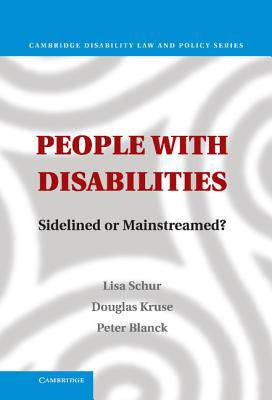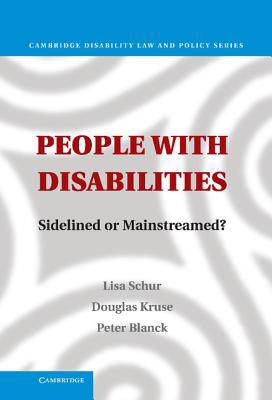
Bedankt voor het vertrouwen het afgelopen jaar! Om jou te bedanken bieden we GRATIS verzending (in België) aan op alles gedurende de hele maand januari.
- Afhalen na 1 uur in een winkel met voorraad
- In januari gratis thuislevering in België
- Ruim aanbod met 7 miljoen producten
Bedankt voor het vertrouwen het afgelopen jaar! Om jou te bedanken bieden we GRATIS verzending (in België) aan op alles gedurende de hele maand januari.
- Afhalen na 1 uur in een winkel met voorraad
- In januari gratis thuislevering in België
- Ruim aanbod met 7 miljoen producten
Zoeken
€ 95,45
+ 190 punten
Uitvoering
Omschrijving
To what extent are people with disabilities fully included in economic, political, and social life? People with disabilities have faced a long history of exclusion, stigma, and discrimination, but have made impressive gains in the past several decades. These gains include the passage of major civil rights legislation and the adoption of the 2006 UN Convention on the Rights of Persons with Disabilities. This book provides an overview of the progress and continuing disparities faced by people with disabilities around the world, reviewing hundreds of studies and presenting new evidence from analysis of surveys and interviews with disability leaders. It shows the connections among economic, political, and social inclusion, and how the experience of disability can vary by gender, race, and ethnicity. It uses a multidisciplinary approach, drawing on theoretical models and research in economics, political science, psychology, disability studies, law, and sociology.
Specificaties
Betrokkenen
- Auteur(s):
- Uitgeverij:
Inhoud
- Aantal bladzijden:
- 306
- Taal:
- Engels
- Reeks:
Eigenschappen
- Productcode (EAN):
- 9781107000476
- Verschijningsdatum:
- 10/06/2013
- Uitvoering:
- Hardcover
- Formaat:
- Genaaid
- Afmetingen:
- 160 mm x 231 mm
- Gewicht:
- 566 g

Alleen bij Standaard Boekhandel
+ 190 punten op je klantenkaart van Standaard Boekhandel
Beoordelingen
We publiceren alleen reviews die voldoen aan de voorwaarden voor reviews. Bekijk onze voorwaarden voor reviews.









